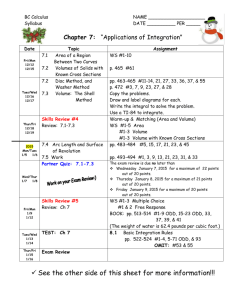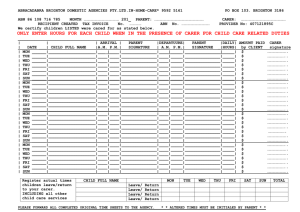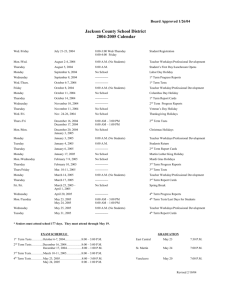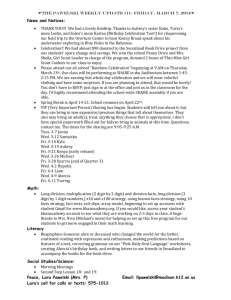Sociology 340: Research Methods
advertisement
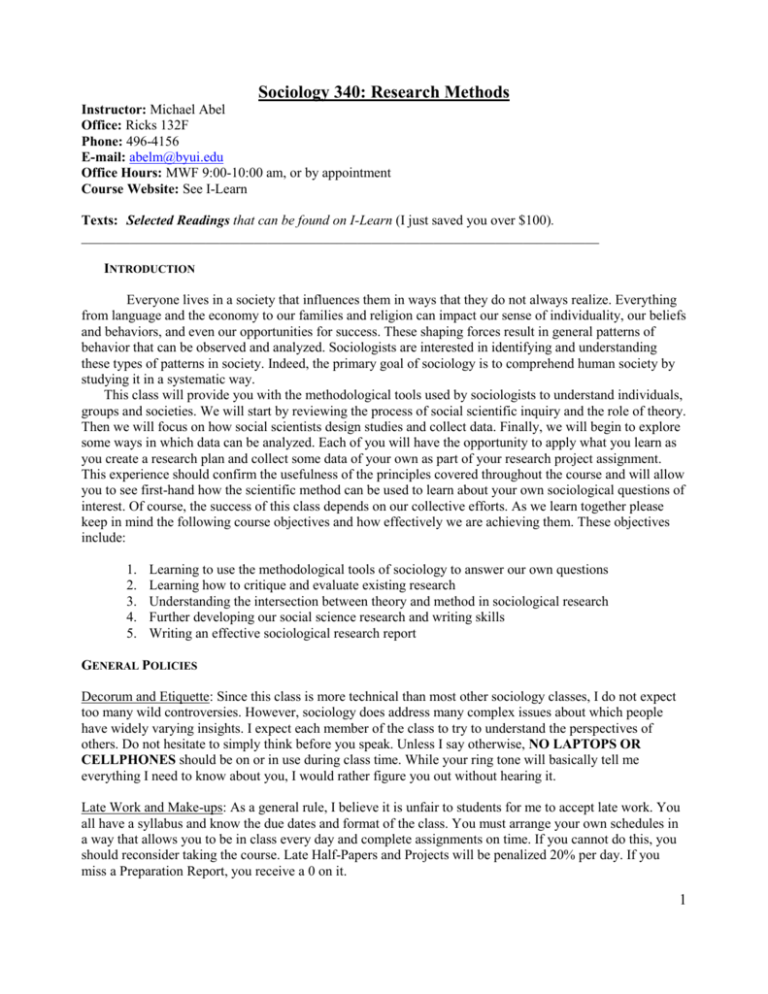
Sociology 340: Research Methods Instructor: Michael Abel Office: Ricks 132F Phone: 496-4156 E-mail: abelm@byui.edu Office Hours: MWF 9:00-10:00 am, or by appointment Course Website: See I-Learn Texts: Selected Readings that can be found on I-Learn (I just saved you over $100). ___________________________________________________________________________ INTRODUCTION Everyone lives in a society that influences them in ways that they do not always realize. Everything from language and the economy to our families and religion can impact our sense of individuality, our beliefs and behaviors, and even our opportunities for success. These shaping forces result in general patterns of behavior that can be observed and analyzed. Sociologists are interested in identifying and understanding these types of patterns in society. Indeed, the primary goal of sociology is to comprehend human society by studying it in a systematic way. This class will provide you with the methodological tools used by sociologists to understand individuals, groups and societies. We will start by reviewing the process of social scientific inquiry and the role of theory. Then we will focus on how social scientists design studies and collect data. Finally, we will begin to explore some ways in which data can be analyzed. Each of you will have the opportunity to apply what you learn as you create a research plan and collect some data of your own as part of your research project assignment. This experience should confirm the usefulness of the principles covered throughout the course and will allow you to see first-hand how the scientific method can be used to learn about your own sociological questions of interest. Of course, the success of this class depends on our collective efforts. As we learn together please keep in mind the following course objectives and how effectively we are achieving them. These objectives include: 1. 2. 3. 4. 5. Learning to use the methodological tools of sociology to answer our own questions Learning how to critique and evaluate existing research Understanding the intersection between theory and method in sociological research Further developing our social science research and writing skills Writing an effective sociological research report GENERAL POLICIES Decorum and Etiquette: Since this class is more technical than most other sociology classes, I do not expect too many wild controversies. However, sociology does address many complex issues about which people have widely varying insights. I expect each member of the class to try to understand the perspectives of others. Do not hesitate to simply think before you speak. Unless I say otherwise, NO LAPTOPS OR CELLPHONES should be on or in use during class time. While your ring tone will basically tell me everything I need to know about you, I would rather figure you out without hearing it. Late Work and Make-ups: As a general rule, I believe it is unfair to students for me to accept late work. You all have a syllabus and know the due dates and format of the class. You must arrange your own schedules in a way that allows you to be in class every day and complete assignments on time. If you cannot do this, you should reconsider taking the course. Late Half-Papers and Projects will be penalized 20% per day. If you miss a Preparation Report, you receive a 0 on it. 1 Students with disabilities: I will gladly provide accommodations for students with disabilities as recommended by Disability Service Center (McKay 158, 496-1158). All services are coordinated with the student and the instructor by this office. They can provide you with important information about accommodations that may be available to you for this class. Cheating and Plagiarism: While all students, especially those at BYU-Idaho, know it is wrong to cheat and plagiarize, it still happens. There are specific skills students need to master in order to correctly cite sources, especially in this new age of the internet. Each of you must read the Honor Code policies related to academic honesty, including how the university defines and punishes this kind of academic misconduct: http://www.byui.edu/studenthonor/academic%20honest.htm. Also, please review the examples of academic misconduct noted at the following website: http://depts.washington.edu/grading/issue1/honesty.htm#misconduct. Finally, always remember what my statistics teacher used to say—“Cheaters die!” COURSE REQUIREMENTS Prepare Preparation Reports: Effective preparation is crucial to your learning in this class. Each day there is reading assigned on the Course Outline you are required to complete a Preparation Report (PR) on I-Learn BEFORE you come to class. In this report you will evaluate the extent of your preparation for that day by indicating whether or not you did the following: 1. In addition to reading and studying assigned texts, I looked up, read, and studied other materials that solidified my understanding of the principles and procedures presented. 2. I took useful and detailed notes on everything I read and cited the sources I used next to the related notes (using ASA format). 3. Applying and citing (in ASA format) specific ideas from the reading and my own research, I completed the task listed on the Course Outline and explained why the task was done well. You are required to bring all of your preparation to class and from time to time I will have you turn in those materials. If your self-reported scores are inconsistent with your actual preparation, I will let you know and will change your PR score accordingly. Each Preparation Report is worth 3 points. Failure to submit a preparation report prior to class time will result in a 0 for that day. Research Outline: In order to maximize your preparation for the Half-Paper and to get some feedback prior to its due date, you are required to submit a Research Outline. This will be a one-page summary of the core elements of your Half-Paper. An example of a Research Outline will be posted on I-learn. The Research Outline is due on Wednesday, May 26th and is worth 10 points. Teach One Another Participation: If you properly prepare, you will come to class with a good understanding of the principles and procedures we are trying to learn and will have already attempted to apply that knowledge to your own work. Consequently, class time can be focused on addressing specific questions and further developing our ability to conduct and evaluate research. During class we will most often be engaged in activities that require you to discuss, contemplate and further apply the information you are studying. Each participation activity will be worth 5 points and many of them will be graded. Part of the grade will be based on how effectively you apply your preparation materials, so make sure you always bring your preparation to class. 2 Ponder and Prove Half-Paper: You will be required to further develop and formalize the first half of the project you have been working on over the past two courses. This is your chance to prove your understanding of all the principles and methods we learn during the first part of the course. Your Half-Paper should follow the format indicated on the Half-Paper Guidelines sheet and will be worth 50 points. The Half-Paper is due on Monday, June 7th. Failure to turn in this assignment will result in a failing grade for the course. Group Research Project: Applying the directions given on the Research Project Guidelines sheet, each of you in a group will be expected to apply the methodological tools learned throughout the course to a specific question of interest that can be researched by surveying BYU-Idaho students. Each group will be expected to turn in a paper that is no longer than 10 pages on Friday, July 16th. Your group must also prepare a 15 minute presentation designed to relate the findings of your research. Directions for the presentation are included on the guidelines sheet. While I hope these presentations will be enjoyable and interesting, they must also be professional and respectful. Your paper and presentation will be worth 50 points. Failure to participate in this project will result in a failing grade for the course. Group Grade: Each person in the class will be given the opportunity to evaluate the contributions of their fellow group members. Since I cannot know how much you participated in the group project, it seems only fair that those who do know have the power to determine your grade. Each member of your group will grade your contribution to the project on a scale of 0 to 5. The proportion of points out of 5 you are given by your group members is the same proportion of the final project grade you will earn. This should motivate you to be a good group member. Of course, I would hope you would work hard for your group simply because it’s the right thing to do. GRADING Your grade will be calculated by adding up all of your points and converting them into a percentage. The percentage will be rounded to the nearest whole number and can be interpreted as follows: Percentage Grade Meaning 90-100 87-89 83-86 80-82 77-79 73-76 70-72 60-69 Lower than 60 A B+ B BC+ C CD F Outstanding Understanding Considerable/Significant Understanding Sufficient Understanding Poor Performance and Initiative Failure in the Course 3 COURSE OUTLINE AND READING ASSIGNMENTS Required Reading Day Date Wed 04/21 Syllabus Cheating and Plagiarism Links Fri PR#1 Due Mon PR#2 Due Wed Fri PR#3 Due Mon 04/23 Assortment of News Articles Babbie 2004, Chapter 4 (pages 86-90)—Purposes of Research Justify why the research you are doing should be done. 04/26 Pyrczak and Bruce 2007, “Writing Introductions and Literature Reviews” Giarrusso et al. 2008, “Working with Sources” Write at least 2 paragraphs of your own introduction/literature review. 04/28 No Reading—Finding Out What Others Already Know 04/30 Chris Olsen on Library Resources Stark and Roberts 2002, “Steps in the Social Scientific Process” Babbie 2004, Chapter 4 (pages 107-114) Outline each step of your own research project. 05/03 No Reading—Discussion of the Research Process Wed PR#4 Due Fri 05/05 Giarrusso et al. 2008, “Framing a Question” 05/07 Compose your own research question. No Reading—Discuss Half-Paper and Organize Project Groups Mon 05/10 No Reading—Peer Feedback Wed 05/12 Bring 3 Copies of Introduction Draft to Class Babbie 2004, Chapter 5 (pages 119-131)—On Conceptual Definitions Pyrczak and Bruce 2007, “Writing Definitions” (pages 63-66) PR#5 Due Fri PR#6 Due Mon PR#7 Due Wed PR#8 Due Fri PR#9 Due Define the concepts you are using in your own research. 05/14 Stark and Roberts 2002, “Concepts and Theories” Compose the theoretical proposition of your own research. 05/17 Babbie 2004, Chapter 4 (pages 90-101)—Causality and Reasoning Compose an effective explanation of your theoretical proposition. 05/19 Babbie 2004, Chapter 5 (pages 132-140)—On Operational Definitions Pyrczak and Bruce 2007, “Writing Definitions” (pages 66-70) Provide operational definitions for each of your concepts. 05/21 Babbie 2004, Chapter 5 (pages 140-146)—Validity and Reliability Determine the validity and reliability of your concept measures. 4 Mon 05/24 PR#10 Due Wed 05/26 Fri Mon Giarrusso et al. 2008, “The Quantitative Research Paper” Stark and Roberts 2002, “Writing the Research Report” Apply specific principles in the reading to improve your paper. No Reading—Peer Feedback 05/28 Bring 3 Copies of Your Half-Paper Draft Research Outline Due No Reading—Any Last Questions? 05/31 Bring Laptops—Ask about and Work on Final Draft of Half-Paper NO SCHOOL—MEMORIAL DAY Wed 06/02 PR#11 Due Fri 06/04 Trochim 2006, “Constructing the Survey” Mon 06/07 No Reading—Survey Construction and Formatting Wed 06/09 No Reading—Indexes and Scales Create a one-page survey that could be used to test your Half-Paper hypotheses. No Reading—Survey Construction and Formatting Half-Paper Due Fri 06/11 PR#12 Due Mon 06/14 PR#13 Due Wed 06/16 ccnmtl.columbia.edu 2008 and Trochim 2006, “Sampling” Fri 06/18 No Reading—Ethics at BYU-Idaho Mon 06/21 Scott Bergstrom on Ethics at BYU-Idaho No Reading—Any Last Questions? Wed 06/23 Bring Laptops—Work on Group Survey No Reading—Peer and Instructor Feedback 06/25 Bring 4 Final Copies of Your Survey to Class NO CLASS—FINALIZE SURVEY AND SEND IT OUT Fri Mon 06/28 PR#14 Due Wed 06/30 Specify the sampling procedure you would use to collect data for your Half-Paper. Babbie 2004, Chapter 3 (All)—The Ethics and Politics of Social Research Identify ethical problems with conducting your Half-Paper research and resolve them. No Reading—More on Ethics Trochim 2006, “Data Preparation” Assign codes to the data from your group survey. No Reading—Creating Effective Tables 5 Fri 07/02 PR#15 Due Mon 07/05 Trochim 2006, “Qualitative Research” Wed 07/07 PR#16 Due Fri 07/09 Pyrczak and Bruce 2007, “Writing Abstracts” Propose two studies that would be best conducted using qualitative methods. NO SCHOOL—INDEPENDENCE DAY OBSERVED Compose a potential title and abstract for your group paper. NO CLASS—FINALIZE DATA COLLECTION AND CODING Mon 07/12 Schedule an appointment with me for help with data analysis. NO CLASS—FINALIZE DATA COLLECTION AND CODING Wed 07/14 NO CLASS—WORK ON PROJECTS Fri 07/16 Presentation Day Mon 07/19 Presentation Day Wed 07/21 Presentation Day Group Research Paper Due 6



